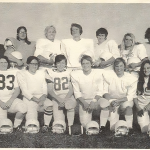It was a summer morning. I was engaged with my books in my room. I loved reading, and won awards for the most books read during the non-school summertime. She came down the hall and walked into my room. I looked up.
“You have dishes to dry.” She said. “Now!”
I didn’t finish the sentence I was reading. I knew better than to antagonize. I closed the book and put it on the table. I got up and followed her to the kitchen.
There were many dishes, pots, and pans in the metal dish drainer. I reached up and grasped the towel. As I reached for a dinner plate, I dropped the towel to the floor. The plate clanged against a pot as I bent down to pick up the towel. That’s when the yelling started.
“You bad girl, that’s a dirty towel. You can’t wipe clean dishes with a dirty towel.”
I drooped my head, and stopped moving. She moved to the other side of the sink, opened a drawer and took out a folded towel. She whisked it at me. I kept my eyes down, but gripped the new towel.
As I took the dinner plate from the dish drainer, the pot shifted and smashed into the plate. That’s when the drama intensified.
“You’re always nerving me up, you bad girl.” She screamed at me.
That’s when I looked at her. Her eyes were intense. She smacked me. I dropped the plate. It broke on the tile floor.
There was a basket of clean clothes recently taken from the dryer just outside the laundry room, adjacent to the kitchen. As she snagged the clothes basket, Mom grabbed me, and dragged me into the living room. She thumped me down on the small chair that was sitting in the center of the room close to the fireplace. The seat was quite stubby. A little child’s chair that fit with a tea-set small table. Being only about eight years old, I was rather tiny for my age.
Mom rambled through the clean clothes basket and pulled out socks. She stretched the stockings. First, she grasped my right arm and tied my wrist to the back of the chair. Then, she tied my left arm to the chair. She pulled out more socks, and bound each ankle to the front legs of the chair.
“This is what you get for nerving me up. Again! You bad girl!” She stared at me. Then she walked out of the room.
I don’t know how long I was tied up with socks in the living room. What I do remember is that the tension I was feeling was intense. After a little while, I remember breathing. My eyes began blinking. I couldn’t get away, and my blinking eyes were reacting on their own. No control. This nervous eye effect was the most dramatic affect of this trauma. As I tell this story, I feel anxious, twitchy jumpiness at my eyes.
I blinked my eyes nervously for the next ten years, throughout high school. I relieved this nervous disorder when I was 18 years old.
As I narrow into the perception of the childhood experience of my mom tying me up, and the effect of that incident, I realize that there was even more to this story than I had initially contemplated.
The most important effect of being tied up, was that I was unable to relieve myself of my reaction to, and belief in my mom’s words “you’re a bad girl”. I heard this script from my mother consistently throughout my childhood. Going outside and running, climbing trees, playing sports with other kids, riding my bike, and groveling in the dirt building cities and castles relieved me of the torment, and notion that her comment was true. Sports and physical activity are sacrosanct for “saving my life”.
By being tied up and unable to move or go outside, I was unable to relieve the distress, and the suffering of the possibility that I was truly, a “bad girl”. The concept took hold within my little child’s mind. There was no query. During the time I sat with my hands and feet tied to the chair, I began to believe that I was a “bad girl”. There was no relief in sight, I couldn’t get away.
In 1979, about twenty-seven years after the childhood tie up situation, I was admitted to Stetson University College of Law. The years of my matriculation and attendance in law school were quite interesting, and many of the events are subjects of other memoirs. But, suffice it to say that my ability to shed the heavy fallacious conviction imposed in my early years was one of the most advantageous events.
Living in north Tampa, Florida I drove to Gulfport, about 35 miles away, for 8:00 a.m. classes, three times per week. Early morning was a relatively unobtrusive driving time. The trip usually took a little over an hour. Rarely, more than an hour and a half. During the commute, I realized that I could pay attention to my driving, and feel the sting of the words “you’re a bad girl”. My feelings were still connected with this painful trauma. I discovered that I could shift the gut-wrenching hurt.
I breathed deeply while paying attention to external traffic and road conditions. No radio. Cruise-control when on the Interstate. I began: “I’m a good girl”. I continued to say this over and over again. Constantly, hundreds of times, out-loud. Often, tears would flow down my face. I was glad I didn’t wear eyeliner.
Sometimes, after crying, I would commence laughing. Crying was, and still is unusual for me because at about age nine I swore, after a belt beating, to never cry again. I smile as I see the light of creating another memoir of clearing childhood abuse.
I kept up my mantra “I’m a good girl” for the entire time of my Stetson University law school education, until I graduated with a Juris Doctor degree in 1982. By that time, I had shifted my child’s distorted inner script to the truth. I AM a good girl!



